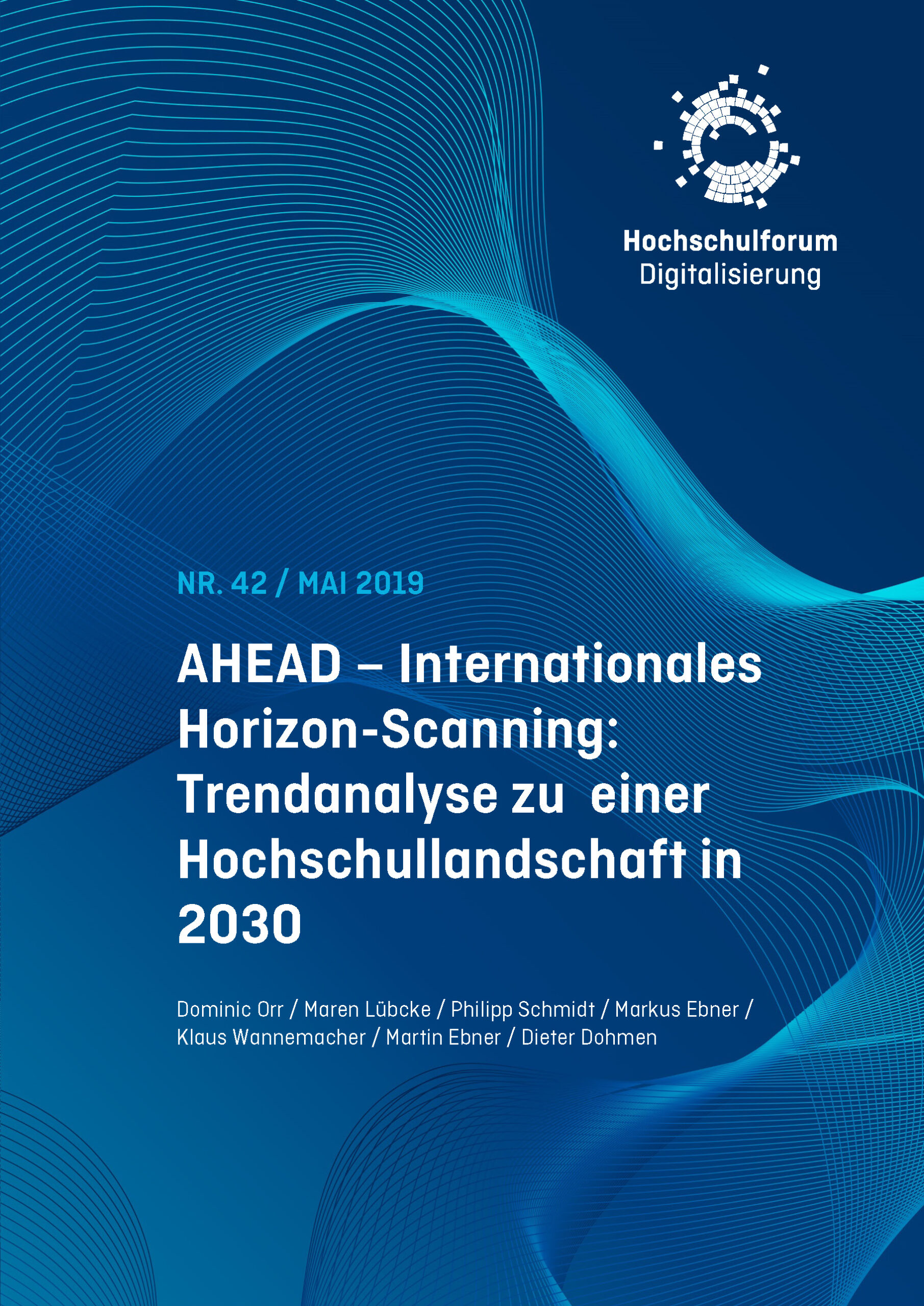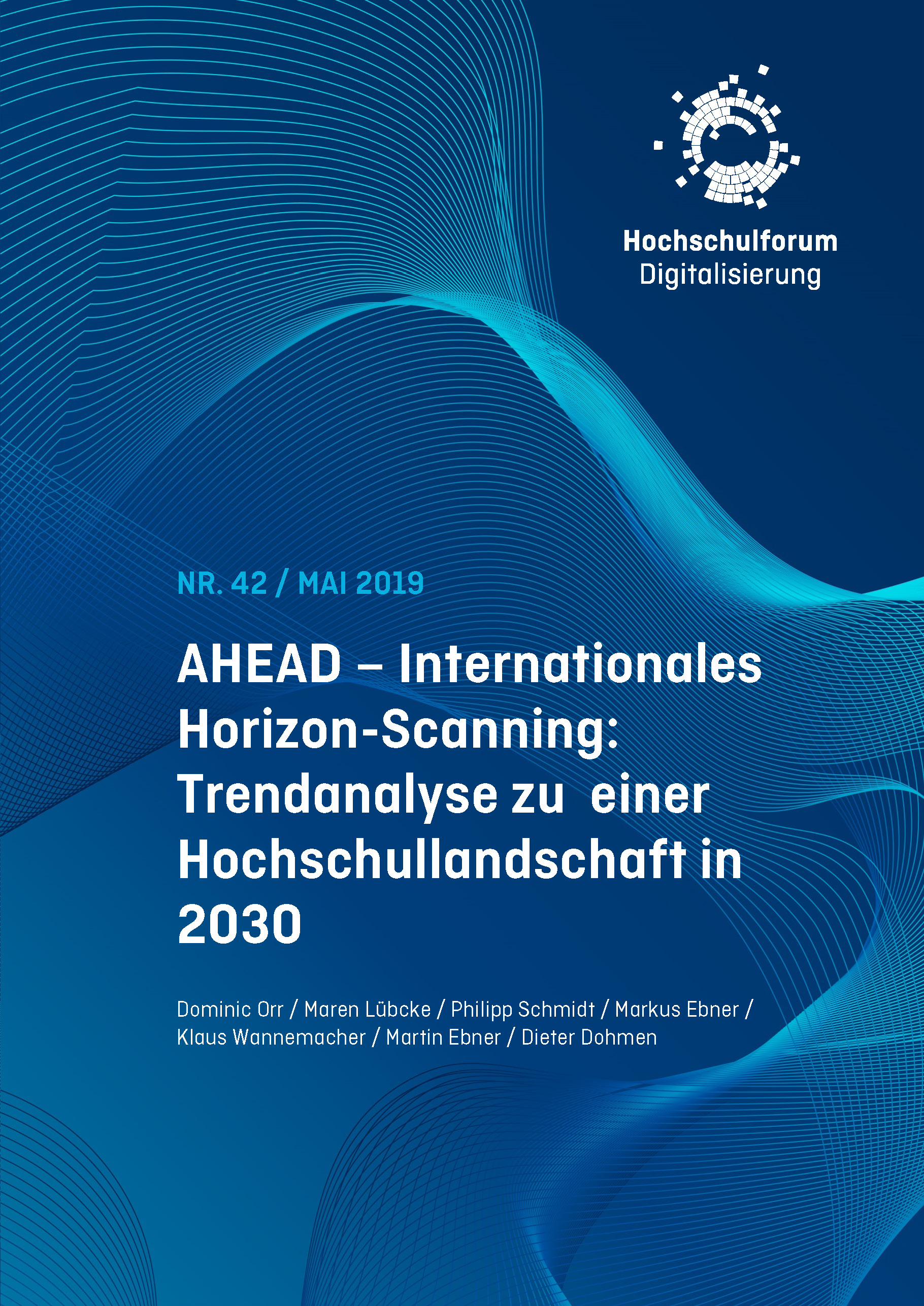AHEAD-STUDY ON THE UNIVERSITY LANDSCAPE 2030: DEPARTURE FROM CLASSICAL STUDIES
AHEAD-STUDY ON THE UNIVERSITY LANDSCAPE 2030: DEPARTURE FROM CLASSICAL STUDIES
23.05.19
Digital change is creating completely new learning paths. The currently predominant model of a three- to five-year study block followed by lifelong work is losing relevance. It is replaced by more flexible, often lifelong study models. Universities and politics must create the conditions for this. This is shown by the AHEAD study presented today by FiBS together with HIS-HE and other experts, which summarises the assessments of more than 100 international experts* in a trend analysis. In the following, we reproduce the press release published on 23 May 2019.
[The content of this page was translated via DeepL. Please excuse possible errors or imprecisions.]
The trend analysis of the AHEAD study suggests that new study models will become significantly more important without completely replacing the previous concept. This change in learning behaviour has considerable consequences for the future management and financing of higher education institutions, but also for the recognition and transfer of competences and learning modules into higher education degrees.
Digitisation is not only changing the qualifications and competences required of university graduates, it is also likely to have an impact on the learning and study behaviour of student groups.
According to the AHEAD study on the higher education landscape in 2030, there could be four different learning models in the higher education landscape in the future:
„Tamagotchi“ – the „classic“ model of the direct transition from school to higher education,
„Jenga“ – a shortened first degree course, which is extended by new learning blocks in the further course of one’s life,
„Transformer“ – the concept of later transition to higher education, e.g. after completion of training and gainful employment, and
„Lego“ – individually combinable educational modules. This is based on the assumption that learners request different modules and learning units from different education providers and that these are individually combined and put together to form a degree.
According to the AHEAD study, in the Jenga and Lego models the universities would have the task of certifying the competences acquired from other providers in previous learning units and converting them into a ‚regular‘ and fully-fledged degree. „This model is not fundamentally new,“ says Dr. Dieter Dohmen, Director of FiBS. „But it is still a rare exception. We assume that this will change significantly in the future. Accordingly, the importance of known study models is declining.“
On the one hand, this change in study behaviour has an impact on the universities and their offerings. „They will have to pay more attention to the individual competences or previous knowledge they have and adjust their courses accordingly,“ says the educational researcher. „The certification of competences acquired elsewhere – for example online – will also become more important.
On the other hand, there will be considerable effects on the management and financing of higher education institutions, as the study behaviour and thus the utilisation of concrete university achievements, such as teaching and study programmes, will become more variable. If, therefore, universities continue to be financed almost exclusively on a flat-rate basis, this does not reflect actual capacity utilisation and leads to under- or over-financing. One approach that goes in this direction is the study account model developed by FiBS, which finances universities on the basis of their respective ECTS credits.
While there are a number of trend studies that deal with the effects of digitisation on economic development and the qualifications demanded on the labour market as well as with the effects on higher education institutions from an internal perspective, the AHEAD study pursues a different approach: it is based on individual learning and study behaviour and derives the resulting requirements on higher education institutions. Dr. Dominic Orr, project leader of the study, emphasizes the necessity of a strategic approach to digitization: „The practical examples in particular show that reforms do not originate from technology, but rather that learning in higher education must be rethought in order to benefit from the advantages of digitization.
In addition to the main report of the AHEAD study, FiBS, HIS-HE and the other experts present four in-depth reports on topics such as the knowledge and competence requirements of a digital society, the challenges of higher education didactics and the technological prerequisites of higher education. „These show that a gradual shift in emphasis towards teaching aimed at strengthening independent student learning can be expected,“ emphasises Klaus Wannemacher, sub-project leader of the study at HIS-HE. „In addition, however, it is becoming apparent that ‚digitisation‘ is likely to lose importance by 2030. The more digital elements become a self-evident component of student communication and learning processes, the more the contrast between analogue and digital learning scenarios will dissolve.
About the AHEAD study
The study „Horizon Scanning: Trend analysis towards a higher education landscape 2030“, study commissioned by the Federal Ministry of Education and Research.
FiBS is a private, interdisciplinary research and consulting institution as well as a leading think tank on lifelong learning from daycare to continuing education and its interfaces to digitisation, the labour market, innovation and social issues in Germany and Europe. Our mission statement is: Enhancing Lifelong Learning for All.
The HIS Institute for Higher Education Development e. V. (HIS-HE) is a research-based, independent competence center sponsored by the federal states that offers consulting services and know-how transfer on topics related to university development and the organization of research and teaching.
The Hochschulforum Digitalisierung (HFD) orchestrates the discourse on higher education in the digital age. As a central initiator, it informs, advises and networks actors from universities, politics, business and society. The HFD was founded in 2014. It is a joint initiative of the Stifterverband für die Deutsche Wissenschaft, the CHE Centre for Higher Education Development and the German Rectors‘ Conference (HRK). It is funded by the Federal Ministry of Education and Research.
Press contact for the AHEAD study
Dr. Dieter Dohmen, FiBS Research Institute for Educational and Social Economics, Berlin: d.dohmen@fibs.eu, 030/8471223-0 or 0172/2676825
Dr. Klaus Wannemacher, HIS Institute for Higher Education Development, www.his-he.de, wannemacher@his-he.de, phone 0511 169929-23

